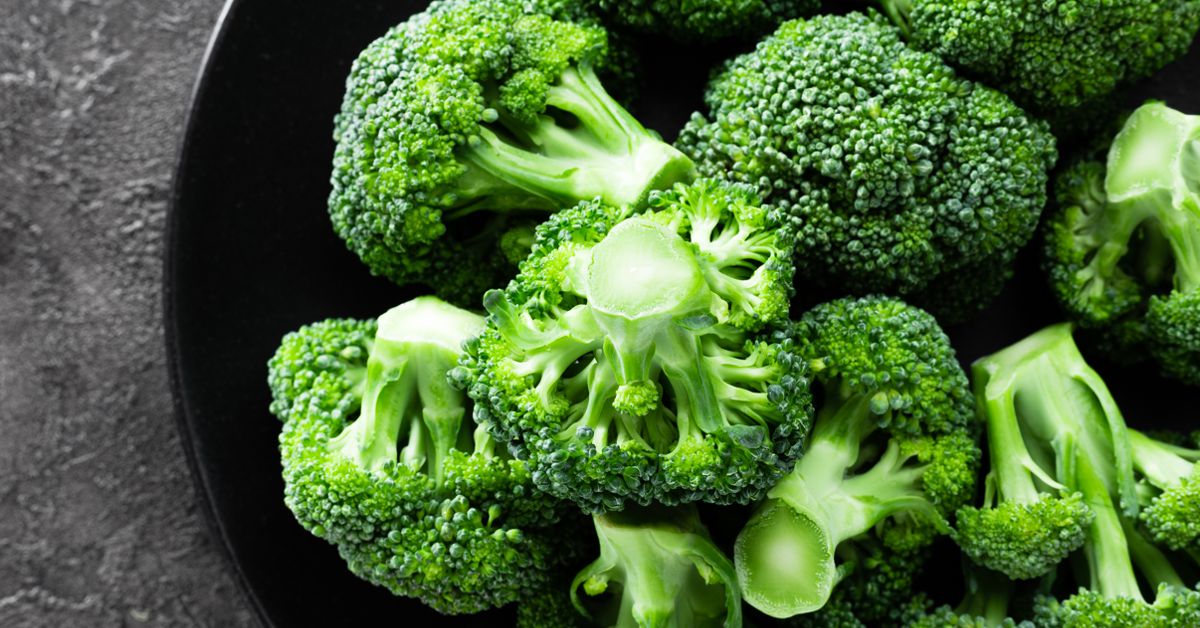Broccoli is a green vegetable that is often overlooked, but it is actually packed full of nutrients and has numerous health benefits.
In this blog post, we will explore the nutritional value of broccoli, the various health benefits of eating it, and how to incorporate it into your diet.
Broccoli is a member of the cruciferous vegetable family, which also includes cauliflower, Brussels sprouts, and kale.
It is high in fiber, vitamin C, and various antioxidants, making it a nutritious addition to any diet.
Not only is it good for you, but it is also very versatile in the kitchen and can be used in a variety of dishes.
So, why should you add more broccoli to your diet? Keep reading to find out!
Nutritional Value of Broccoli
Broccoli is a nutritious vegetable that is packed with a variety of essential vitamins and minerals.
It is a good source of fiber, vitamin C, vitamin K, potassium, and a number of other important nutrients. In this section, we will take a closer look at the nutritional value of broccoli and how these nutrients contribute to overall health.
Fiber
One of the most notable nutrients found in broccoli is fiber.
Fiber is an important component of a healthy diet, as it helps to keep the digestive system functioning properly.
It can also help to lower cholesterol levels and regulate blood sugar levels.
A single serving of broccoli (around one cup) contains 2.6 grams of fiber, which is about 10% of the recommended daily intake.
Vitamin C
Broccoli is also a rich source of vitamin C. This vitamin is essential for maintaining a healthy immune system and is also necessary for the production of collagen, a protein that is important for healthy skin, bones, and connective tissue.
A single serving of broccoli contains over 100% of the recommended daily intake of vitamin C.
Vitamin K
Broccoli is a nutritious vegetable that is high in fiber and vitamin C, as well as vitamin K.
This essential nutrient is necessary for proper blood clotting and bone health, as it helps to synthesize proteins involved in bone metabolism.
One serving of broccoli provides over 150% of the recommended daily intake of vitamin K.
Potassium
Potassium is another important nutrient found in broccoli. This mineral is necessary for maintaining normal blood pressure and heart function. It is also important for proper muscle function and water balance in the body. A single serving of broccoli contains about 8% of the recommended daily intake of potassium.
Extra Nutrients
In addition to these nutrients, broccoli is also a good source of a number of other important vitamins and minerals, including folate, iron, and calcium.
These nutrients contribute to a variety of health benefits, including the production of red blood cells, proper nerve function, and bone health.
Broccoli and good health
Overall, the nutritional value of broccoli makes it a great choice for maintaining good health.
Its high fiber and vitamin content can help to improve digestion, boost the immune system, and promote healthy skin, bones, and connective tissue.
Its potassium content can help to regulate blood pressure and heart function, while its other vitamins and minerals can provide a variety of additional health benefits.
Benefits of Eating Broccoli
Broccoli is a nutritious and delicious vegetable that offers numerous health benefits. Here are just a few of the ways that eating broccoli can improve your health:
- Weight loss and digestion: Broccoli is a low calorie and low carbohydrate vegetable, making it a great choice for those looking to lose weight. It is also high in fiber, which can help to improve digestion and keep you feeling full and satisfied.
- Heart health: The nutrients found in broccoli, including potassium, folate, and vitamin C, have been shown to support heart health. These nutrients can help to lower blood pressure and reduce the risk of heart disease.
- Cancer prevention: Some studies have suggested that the antioxidants found in broccoli may help to reduce the risk of certain types of cancer, such as breast and colon cancer.
- Improved brain function: The high levels of vitamin K and choline found in broccoli have been linked to improved brain function and memory.
Recipes
Incorporating more broccoli into your diet is easy and delicious. Try adding it to stir-fries, roasting it as a side dish, or blending it into a smoothie.
There are endless recipe possibilities with broccoli as a main ingredient, so get creative and enjoy the numerous health benefits this tasty vegetable has to offer.
Broccoli is a nutritious vegetable that can be easily incorporated into your diet for a variety of health benefits.
In this section, we will provide tips for adding broccoli to your meals, creative recipe ideas using broccoli as a main ingredient, and suggestions for using broccoli as a side dish.
Tips for adding broccoli to meals:
- Chop broccoli into small florets and add them to omelets or frittatas
- Puree broccoli and add it to soups or sauces for added nutrition
- Toss broccoli florets with olive oil and roast in the oven as a crunchy snack
- Add broccoli to sandwiches or wraps for a crunchy, healthy boost
Breakfast
- Broccoli and Cheddar Breakfast Strata - a baked breakfast casserole made with broccoli, cheddar cheese, and bread.
- Broccoli and Egg Breakfast Muffins - muffins made with broccoli, eggs, and cheese.
- Broccoli and Turkey Sausage Frittata - a baked egg dish with broccoli, turkey sausage, and cheese.
- Broccoli and Cheese Quiche - a pie filled with broccoli, cheese, and a mixture of eggs and milk.
- Broccoli and Avocado Breakfast Bowl - a bowl of cooked broccoli topped with sliced avocado, eggs, and other desired toppings.

Lunch
- Broccoli and Quinoa Salad - a salad made with cooked broccoli and quinoa, along with other vegetables and a dressing of your choice.
- Broccoli and Cauliflower Soup - a creamy soup made with broccoli and cauliflower.
- Broccoli and Chicken Wrap - a wrap filled with cooked broccoli and diced chicken.
- Broccoli and Hummus Wrap - a wrap filled with broccoli and hummus, along with other desired vegetables.
- Broccoli and Grilled Cheese Sandwich - a sandwich made with broccoli and cheese, grilled in a pan until the bread is crispy and the cheese is melted.
Dinner
- Broccoli and Beef Stir Fry - a stir fry made with broccoli and thinly sliced beef, cooked with a sauce and other desired vegetables.
Broccoli and Shrimp Alfredo Pasta - pasta with a creamy Alfredo sauce, cooked broccoli, and shrimp.
Broccoli and Chicken Parmesan - breaded chicken topped with tomato sauce and mozzarella cheese, served with cooked broccoli on the side.
Broccoli and Lentil Soup - a soup made with broccoli, lentils, and other desired vegetables.
Broccoli and Black Bean Burritos - burritos filled with cooked broccoli, black beans, and other desired toppings.
Suggestions for using broccoli as a side dish
- Roast broccoli in the oven with olive oil and seasonings for a simple, healthy side.
- Add steamed broccoli to a bowl of grains, such as quinoa or rice, for a complete meal.
- Toss broccoli with a lemon vinaigrette and serve as a refreshing salad.
- Mash cooked broccoli and mix with cream cheese for a creamy broccoli dip.
- Grate raw broccoli and add it to coleslaw for an added crunch and nutrition boost.
As you can see, there are many ways to incorporate broccoli into your diet.
Whether you prefer it as a main ingredient or a side dish, this versatile vegetable is a delicious and nutritious choice for any meal.
Try incorporating some of these recipe ideas into your weekly meal plan for a healthy boost.
Conclusion
In conclusion, broccoli is a nutrient-rich vegetable that offers numerous health benefits.
Its high content of vitamins and minerals, including vitamin C, vitamin K, and potassium, make it a great addition to any diet.
Regularly consuming broccoli can help with weight loss and digestion, improve heart health, reduce the risk of cancer, and even enhance brain function.
There are many ways to incorporate broccoli into your meals.
Whether you use it as a main ingredient in dishes like broccoli stir-fry or roasted broccoli, or simply add it as a side to your protein of choice, the options are endless.
And with its mild flavor, broccoli can easily be added to a variety of dishes without overwhelming the other flavors.
We hope that this article has convinced you of the benefits of adding broccoli to your diet, and that you will consider trying some of the recipe ideas we have shared.
If you enjoyed this article and found the information and recipes helpful, we encourage you to bookmark this site for future reference. Happy cooking!

Leave A Comment